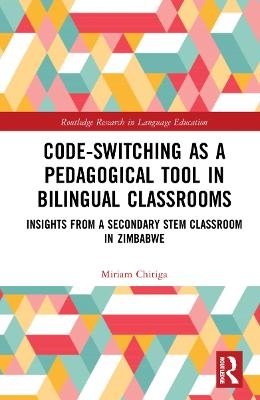
Code-Switching as a Pedagogical Tool in Bilingual Classrooms
Insights from a Secondary STEM Classroom in Zimbabwe
Seiten
2021
Routledge (Verlag)
978-0-367-62354-8 (ISBN)
Routledge (Verlag)
978-0-367-62354-8 (ISBN)
Presenting a mixed methods study conducted in a bilingual mathematics classroom in Zimbabwe, this text reveals the semantic pedagogical functions and linguistic forms of code-switching during STEM instruction.
Code-Switching as a Pedagogical Tool in Bilingual Classrooms offers a detailed analysis of code-switching in the context of educational linguistics, and reveals ten major pedagogical techniques which illustrate how teachers use code-switches to engage students and provide guidance, clarification, discipline, and recaps during individual and whole-class interactions. Chapters highlight that code-switching can be used in a targeted manner to harness the cognitive potential of bilingual speakers and enhance instruction. Ultimately, the text identifies implications for teacher education, language policy, and educational leadership more broadly, and demonstrates intersections with key areas including functional, critical, and cultural literacy.
This text will benefit researchers, academics, and educators with an interest in bilingualism, applied linguistics, and secondary education more broadly. Those specifically interested in multicultural education, sociolinguistics and educational policy will also benefit from this book.
Code-Switching as a Pedagogical Tool in Bilingual Classrooms offers a detailed analysis of code-switching in the context of educational linguistics, and reveals ten major pedagogical techniques which illustrate how teachers use code-switches to engage students and provide guidance, clarification, discipline, and recaps during individual and whole-class interactions. Chapters highlight that code-switching can be used in a targeted manner to harness the cognitive potential of bilingual speakers and enhance instruction. Ultimately, the text identifies implications for teacher education, language policy, and educational leadership more broadly, and demonstrates intersections with key areas including functional, critical, and cultural literacy.
This text will benefit researchers, academics, and educators with an interest in bilingualism, applied linguistics, and secondary education more broadly. Those specifically interested in multicultural education, sociolinguistics and educational policy will also benefit from this book.
Miriam Chitiga is Professor of Educational Leadership, Fayetteville State University, USA
1: Introduction – Understanding the Role of Language in Education
2: Code-Switching Within a Larger Context
3: Methodology Used to Conduct the Case Study on Code-Switching in the Classroom
4: Analysis of Semantic Pedagogical Functions of the Code-Switches
5: Frequency and Distributions of Semantic Pedagogical Functions of the Code-Switches
6: Observations and Implications for Policy, Research, and Teaching
| Erscheinungsdatum | 01.12.2021 |
|---|---|
| Reihe/Serie | Routledge Research in Language Education |
| Zusatzinfo | 9 Tables, black and white |
| Verlagsort | London |
| Sprache | englisch |
| Maße | 152 x 229 mm |
| Gewicht | 453 g |
| Themenwelt | Schulbuch / Wörterbuch ► Wörterbuch / Fremdsprachen |
| Geisteswissenschaften ► Sprach- / Literaturwissenschaft ► Anglistik / Amerikanistik | |
| Geisteswissenschaften ► Sprach- / Literaturwissenschaft ► Literaturwissenschaft | |
| Geisteswissenschaften ► Sprach- / Literaturwissenschaft ► Sprachwissenschaft | |
| Sozialwissenschaften ► Pädagogik ► Schulpädagogik / Sekundarstufe I+II | |
| ISBN-10 | 0-367-62354-4 / 0367623544 |
| ISBN-13 | 978-0-367-62354-8 / 9780367623548 |
| Zustand | Neuware |
| Haben Sie eine Frage zum Produkt? |
Mehr entdecken
aus dem Bereich
aus dem Bereich
Poetik eines sozialen Urteils
Buch | Hardcover (2023)
De Gruyter (Verlag)
59,95 €
Buch | Softcover (2024)
belleville (Verlag)
20,00 €


